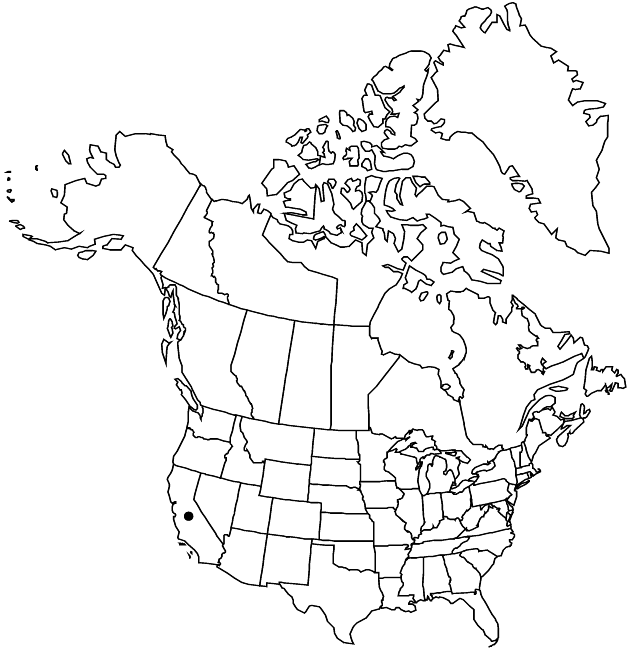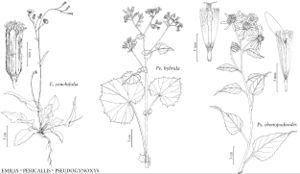Difference between revisions of "Pericallis hybrida"
Opera Bot. 44: 21. 1978.
FNA>Volume Importer |
imported>Volume Importer |
||
| (2 intermediate revisions by 2 users not shown) | |||
| Line 36: | Line 36: | ||
|elevation=10–100 m | |elevation=10–100 m | ||
|distribution=Calif.;Atlantic Islands (Canary Islands). | |distribution=Calif.;Atlantic Islands (Canary Islands). | ||
| + | |introduced=true | ||
|discussion=<p><i>Pericallis hybrida</i> has escaped from cultivation and is established in the cool, damp climate of the San Francisco Bay region. It is a complex of true-breeding cultivars derived from wild progenitors native to the Canary Islands (T. M. Barkley 1966); it is not a naturally occurring species. The cultivars are widely grown in glass houses and are sold as cool-season pot-plants in the horticultural trade.</p><!-- | |discussion=<p><i>Pericallis hybrida</i> has escaped from cultivation and is established in the cool, damp climate of the San Francisco Bay region. It is a complex of true-breeding cultivars derived from wild progenitors native to the Canary Islands (T. M. Barkley 1966); it is not a naturally occurring species. The cultivars are widely grown in glass houses and are sold as cool-season pot-plants in the horticultural trade.</p><!-- | ||
--><p>The name <i>Senecio</i> cruentus (L’Heretier) de Candolle has been widely misapplied to <i>Pericallis hybrida</i> in the horticultural trade.</p> | --><p>The name <i>Senecio</i> cruentus (L’Heretier) de Candolle has been widely misapplied to <i>Pericallis hybrida</i> in the horticultural trade.</p> | ||
| Line 61: | Line 62: | ||
|publication year=1978 | |publication year=1978 | ||
|special status= | |special status= | ||
| − | |source xml=https:// | + | |source xml=https://bitbucket.org/aafc-mbb/fna-data-curation/src/2e0870ddd59836b60bcf96646a41e87ea5a5943a/coarse_grained_fna_xml/V19-20-21/V20_1362.xml |
|tribe=Asteraceae tribe Senecioneae | |tribe=Asteraceae tribe Senecioneae | ||
|genus=Pericallis | |genus=Pericallis | ||
Latest revision as of 20:00, 5 November 2020
Short-lived perennials or facultative annuals, 20–80 cm. Leaves: petioles ± lengths of blades, often with expanded and clasping bases; blades 6–12 × 6–12 cm, margins wavy to dentate (distal leaves smaller, bractlike). Phyllaries 4–6 mm. Ray florets: corollas white or bicolored, proximal 1/3–2/3 of laminae white, the rest purplish to reddish, pinkish, or bluish. Disc corollas 2.5–3.5 mm. Cypselae glabrous or puberulent between ridges; ray cypselae slightly larger and lighter colored than the brown to black disc cypselae (pappi of ray florets 0 or 2 subulate or setiform scales). 2n = 60.
Phenology: Flowering spring (fall).
Habitat: Disturbed sites
Elevation: 10–100 m
Distribution

Introduced; Calif., Atlantic Islands (Canary Islands).
Discussion
Pericallis hybrida has escaped from cultivation and is established in the cool, damp climate of the San Francisco Bay region. It is a complex of true-breeding cultivars derived from wild progenitors native to the Canary Islands (T. M. Barkley 1966); it is not a naturally occurring species. The cultivars are widely grown in glass houses and are sold as cool-season pot-plants in the horticultural trade.
The name Senecio cruentus (L’Heretier) de Candolle has been widely misapplied to Pericallis hybrida in the horticultural trade.
Selected References
None.
